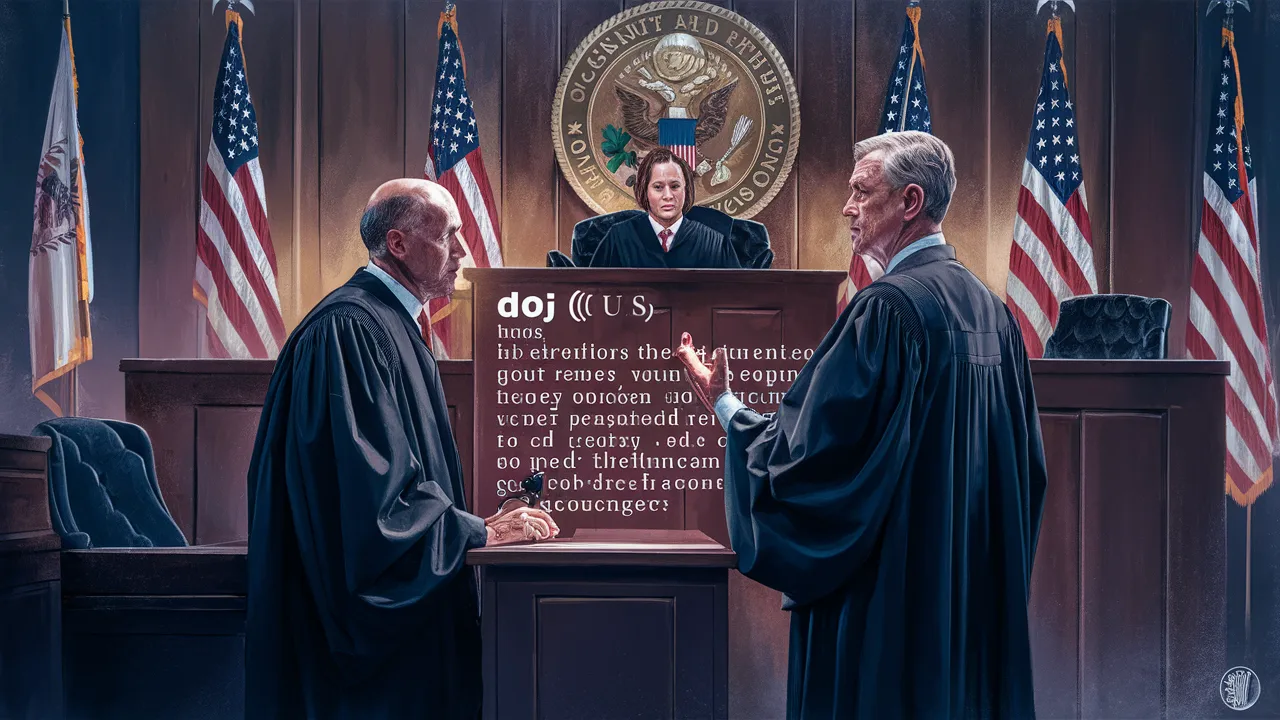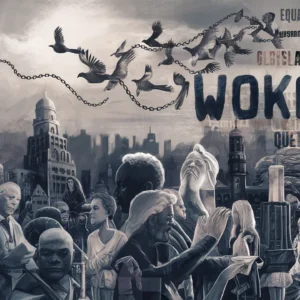Amidst the intricate tapestry of legal systems, an abbreviation stands stark: DoJ (US). Symbolizing the paragon of legal oversight within the United States, the Department of Justice (DoJ) presents itself as a bastion of law enforcement and justice preservation. Unraveling its multifaceted role becomes imperative in navigating the realm of legal intricacies governing our society.
To comprehend the essence encapsulated in DoJ (US) transcends mere linguistic deciphering; it embodies a profound dive into the core of American jurisprudence. By delving into the nuances surrounding this acronym, we unearth a mosaic woven with the significance of safeguarding constitutional principles and fortifying societal integrity.
The essence of this behemoth entity’s existence lies not merely in its nomenclature but in shaping legal landscapes and upholding justice at their very foundations. Exploring the labyrinthine corridors housing this institution reveals crucial insights indispensable for any aficionado orbiting within legal spheres.
Embark on a journey through time and space as we embark on deciphering the historical origins, structural underpinnings, operational intricacies, international liaisons, and future trajectory defining this sentinel entity known as DoJ (US).
As we peel back layers cloaking its omnipresence, unveiling subtle complexities megastructure built over epochs entails immersing oneself in understanding how DoJ crafts not just laws but narratives shaping societal fabrics today.
Step past conventional interpretations to unearth deeper meanings veiled beyond surface connotations – join us in unraveling ‘Understanding the Definition of DoJ (US) in Law.
Definition and Structure of DoJ (US).
The Department of Justice (DoJ) in the United States is a vital federal agency responsible for enforcing the law, representing the U.S. government in legal matters, and ensuring justice is upheld across the country. As the primary enforcement arm, the DoJ plays a crucial role in safeguarding public interests and upholding legal standards.
Structurally, the DoJ comprises various divisions that specialize in different aspects of law enforcement and legal representation. Key divisions within the Department include the Civil Rights Division, which focuses on protecting civil liberties and combating discrimination, and the Criminal Division, dedicated to prosecuting criminal cases at the federal level.
At the helm of this significant institution sits the Attorney General, who serves as the head of the DoJ. The Attorney General is appointed by the President of the United States and leads all legal proceedings on behalf of the government. This position holds immense influence over legal policy formulation and enforcement strategies within federal agencies.
The role demands impartiality, legal expertise, and a commitment to upholding justice without bias or political influence. For example, during times of national crisis or high-profile investigations, such as during significant corruption cases or civil rights disputes, the Attorney General’s decisions can have far-reaching implications for society.
Understanding how these components interplay within DoJ’s structure provides insight into its ability to navigate intricate legal landscapes effectively. By maintaining specialized divisions under centralized leadership, DoJ can efficiently address diverse legal matters ranging from constitutional violations to organized crime prosecutions.
The intricate framework ensures that each division operates cohesively towards achieving greater justice outcomes while also abiding by established legal protocols and principles meticulously defined within its operational scope.
Historical Background of DoJ (US).
The Department of Justice (DoJ) in the United States has a rich historical tapestry woven into the fabric of American law and governance. Established on July 1, 1870, under President Ulysses S. Grant’s administration, the DoJ was originally tasked with handling legal matters pertaining to federal agencies.
Over time, its role expanded significantly, evolving into one of the most crucial institutions safeguarding the rule of law. One notable milestone in the DoJ’s history was its role in shaping antitrust regulation through landmark cases like United States v. Standard Oil Co., which laid the groundwork for modern competition law.
As historical events unfolded, critical changes within the DoJ became apparent. The creation of specialized divisions such as the Civil Rights Division in response to civil rights movements or the Counterterrorism Division post-9/11 underscored its adaptive nature and responsiveness to societal shifts and challenges.
Moreover, pivotal moments like Watergate highlighted the importance of government accountability and transparency, prompting reforms that fortified the DoJ’s commitment to upholding legal standards and justice impartiality.
The significance of historical events reverberates through the DoJ’s current functions and priorities. For instance, lessons learned from high-profile cases like Brown v. Board of Education influenced efforts to combat discrimination and promote equality today.
Furthermore, organizational changes spurred by past crises shaped policies regarding accountability mechanisms and internal oversight to prevent abuses of power or systematic failures.
By delving into its historical evolution, individuals gain a profound understanding of how past experiences have sculpted not only the structure but also the core values embedded within this vital component of America’s legal landscape.
Key Functions and Responsibilities.
The Department of Justice (DoJ) in the United States plays a crucial role in maintaining law and order by executing a variety of functions. As the nation’s principal federal law enforcement agency, one of its primary responsibilities is to conduct investigations and prosecutions to uphold federal laws rigorously.
This involves investigating crimes, bringing charges against offenders, and ensuring justice is served within the overarching legal framework. The active enforcement efforts of the DoJ contribute significantly to deterrence and compliance with federal statutes across diverse sectors of society.
Beyond law enforcement activities, the DoJ also serves as a legal representative for the U.S. government. This entails representing federal agencies in court proceedings, offering legal advice on policy matters, and defending government interests in litigation matters.
The department’s intervention in legal cases ensures that governmental actions align with established laws and regulations while safeguarding public interest through sound legal advocacy. Additionally, the DoJ engages in policy formulation related to legal matters, contributing expertise to shape effective policies for upholding justice throughout the country.
Furthermore, within its mandate, the DoJ diligently works towards safeguarding civil rights, ensuring antitrust regulations are honored, and enhancing national security measures.
By actively protecting civil liberties, tackling anticompetitive practices that harm markets, and fortifying national security through various initiatives, including counterterrorism efforts, DoJ exhibits commitment towards fostering a just society based on equality under the law.
These multifaceted functions underscore how DoJ’s proactive stance influences not only domestic governance but also impacts broader societal well-being by creating an environment conducive to fairness and security for all citizens.
Role in Upholding Justice System Integrity.
The Department of Justice (DoJ) plays a pivotal role in upholding the integrity of the justice system within the United States. It ensures fairness, impartiality, and adherence to legal standards through rigorous enforcement of laws and regulations.
One fundamental mechanism employed by the DoJ to prevent corruption, abuse, or misconduct is its oversight and investigative functions. By overseeing law enforcement agencies and prosecuting those who betray the public trust, the DoJ reinforces accountability and transparency within the justice system.
To illustrate this commitment to integrity, landmark cases such as United States v. Nixon serve as prime examples where the DoJ enforced legal standards regardless of political implications.
In this case, the Supreme Court ruled unanimously that President Richard Nixon had to hand over incriminating tapes related to the Watergate scandal, showcasing how the DoJ’s mandate includes holding even high-ranking officials accountable under the law.
Additionally, initiatives like the Civil Rights Division’s efforts in combatting discrimination and promoting equal protection demonstrate a proactive approach towards upholding justice system integrity beyond traditional legal frameworks.
Furthermore, initiatives like improving police-community relations through consent decrees following investigations into police departments’ civil rights violations exhibit a commitment to fostering trust and cooperation between law enforcement entities and communities they serve.
These examples highlight how the DoJ not only reacts to integrity challenges but also proactively works towards maintaining ethical standards within the justice system—an essential aspect in preserving public confidence in American jurisprudence.
Challenges Faced by DoJ (US).
As a cornerstone of the U.S. justice system, the Department of Justice (DoJ) confronts a myriad of challenges that impact its ability to function effectively and fairly. One prominent challenge stems from political influences that can shape decision-making processes within the department.
Political pressures, varying depending on the administration in power, may introduce biases or hinder certain investigations. Navigating these influences while maintaining independence and upholding the rule of law is a delicate balance that the DoJ constantly grapples with to preserve its integrity.
Resource constraints pose another significant hurdle for the DoJ. The demand for legal services and law enforcement activities often outstrips available resources, leading to operational gaps and delays in critical functions.
In situations where financial limitations restrict hiring or technological advancements, the department must innovate and prioritize judicious resource allocation to maximize its impact despite limited budgets. This necessitates strategic planning and efficient utilization of existing resources to meet the diverse demands placed upon it.
Moreover, evolving legal landscapes present an ongoing challenge for the DoJ as laws change, new precedents emerge, and societal values shift over time. Adapting to these changes requires constant monitoring, legal acumen, and an agile approach to executing its mandate effectively.
By staying abreast of legal developments and proactively adjusting strategies to align with evolving norms, the DoJ can navigate complex legal terrains while remaining true to its mission of upholding justice and enforcing federal laws faithfully.
Through continuous assessment of these challenges and flexible responses guided by their core principles, the DoJ strives to uphold integrity in its operations amidst dynamic environments.
International Cooperation and Impact.
The Department of Justice (DoJ) in the United States plays a vital role in collaborating with international counterparts to address various law enforcement issues. One significant avenue of cooperation is through extradition treaties, which facilitate the transfer of individuals accused or convicted of crimes between countries.
This process not only aids in the apprehension and prosecution of fugitives but also reflects the commitment to upholding justice on a global scale. For example, high-profile cases like that of cartel leader Joaquín “El Chapo” Guzmán involved extensive coordination between DoJ (US) and Mexican authorities, showcasing the importance of cross-border collaboration in bringing criminals to justice.
Furthermore, counterterrorism cooperation stands as a cornerstone of international partnerships for DoJ (US). By sharing intelligence, resources, and expertise with foreign agencies, the Department strengthens its ability to prevent and combat terrorist threats that transcend national boundaries.
The exchange of best practices and joint operations contribute significantly to enhancing security measures globally. For instance, initiatives like the Global Coalition to Defeat ISIS demonstrate how coordinated efforts under DoJ (US) leadership can effectively combat extremist groups operating across multiple countries.
In addition to traditional crime-fighting efforts, international engagements also focus on combating transnational crimes such as cybercrime. With digital advancements enabling criminals to operate from anywhere in the world, harmonizing cybercrime regulations becomes essential.
The DoJ’s involvement in initiatives promoting legal frameworks for data protection and online security fosters a safer digital environment on a global scale.
Collaborative forums like Interpol Cyber Fusion Centre serve as platforms for sharing actionable intelligence and coordinating responses to cyber threats collaboratively, reflecting the evolving nature of law enforcement cooperation in an interconnected world.
Through these collaborations on extradition agreements, counterterrorism operations, and cybercrime regulation harmonization, the Department of Justice (DoJ) (US) underscores its commitment to maintaining law and order beyond national boundaries.
By leveraging international partnerships and engaging with foreign counterparts proactively, DoJ enhances its effectiveness in addressing complex challenges posed by transnational criminal activities while upholding principles of justice and security worldwide.
Conclusion: Understanding DoJ (US) in Law & Its Implications Moving Forward.
In conclusion, grasping the intricacies of the Department of Justice (DoJ) in the United States is fundamental for law students, legal professionals, and government officials alike. Through this exploration, it becomes evident that the DoJ serves as the cornerstone of upholding federal laws, ensuring civil rights protection, and conducting investigations crucial for maintaining justice system integrity.
The structured analysis of its historical evolution, key functions, challenges faced, and international cooperation provides a comprehensive understanding of the multifaceted role played by the DoJ.
Moving forward, stakeholders need to appreciate the critical role the DoJ plays in shaping legal landscapes and protecting societal values. By acknowledging its significance in combating transnational crimes, safeguarding civil liberties, and maintaining system integrity through unwavering adherence to legal standards, professionals can contribute effectively to ensuring justice prevails.
Understanding the Department of Justice not only equips individuals with knowledge but empowers them to navigate complex legal terrains with ethical responsibility and dedication towards upholding justice at its core.




